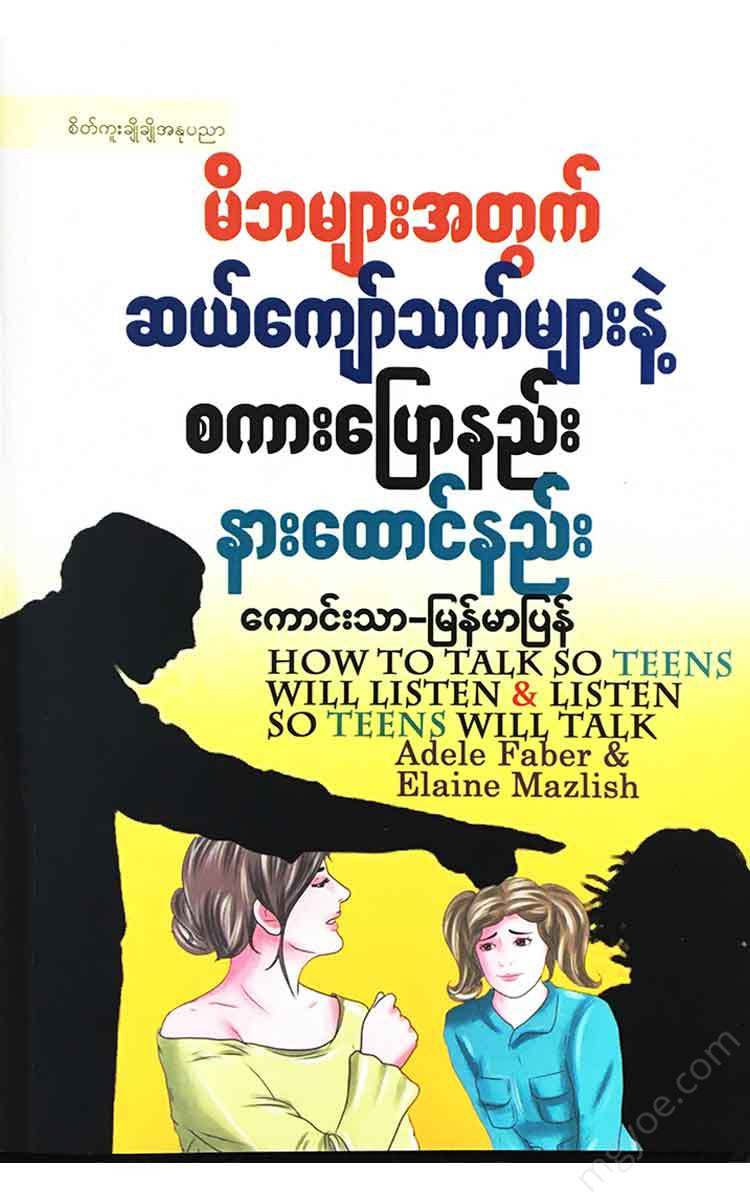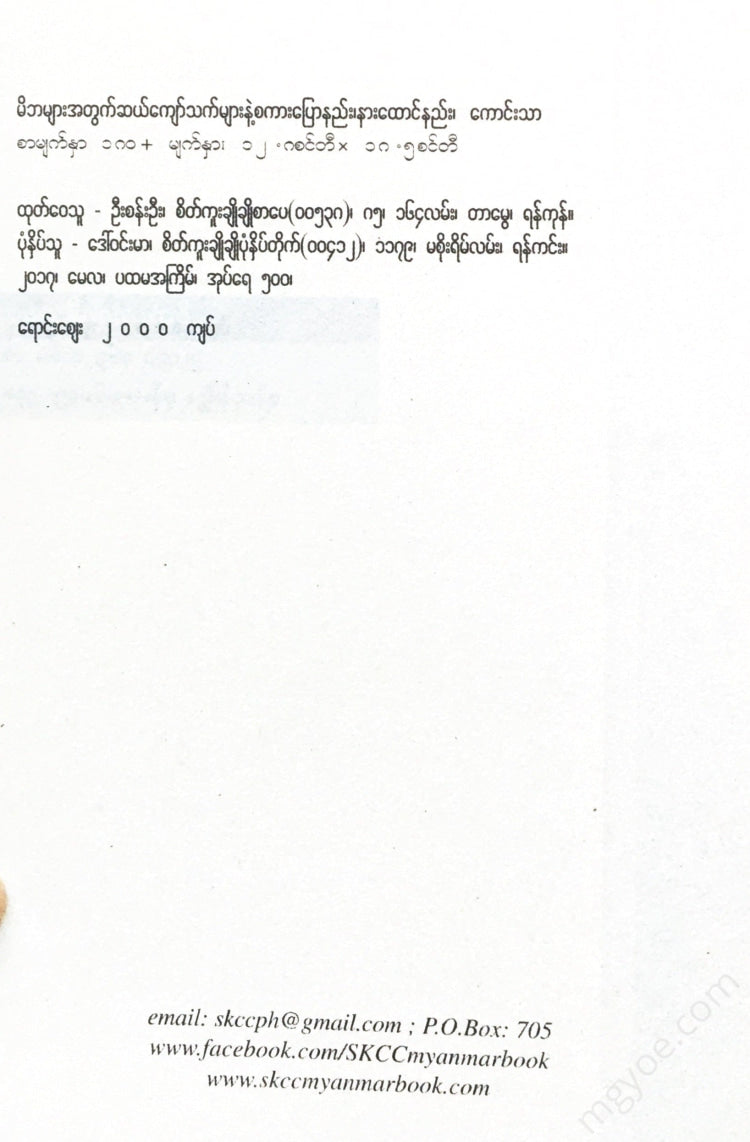စိတ်ကူးချိုချိုစာပေ
Good - How to Talk to Teenagers for Parents and Listen
Good - How to Talk to Teenagers for Parents and Listen
Couldn't load pickup availability
( 1 )
Regarding feelings.
What to expect, I don't know.
As I ran through the rain from the parking lot to the school entrance, my umbrella crumpled in the strong wind, I couldn't help but think that I would have to leave the warmth of my home on such a cold night to attend a workshop with teenagers.
The head of the guidance department greeted me at the door and led me into a classroom where about 20 parents were sitting and waiting.
I introduced my parents and made a congratulatory speech, praising their courage in the face of the terrible weather. Then I handed out name tags for everyone to fill out. As they all filled out their names and chatted, I had the opportunity to observe the group. The people were diverse. There were as many women as there were men. There were also ethnic backgrounds. Some were couples, some were single, some were in business suits, some were in jeans, and some were casually dressed.
When everyone was ready, I asked them all to introduce themselves by name and tell me a little about their child.
There was no hesitation. One by one, parents talked about their children, teenagers ranging in age from 12 to 16.
Everyone has commented that it's difficult to be a teenager in today's world. People look at you, and you feel like you're being watched. You can't immediately open up in a room full of strangers.
"Before I say anything further, I want to make it clear that everything we say here is strictly confidential. Everything we say within these four walls, you guys, is strictly confidential."
Drinking, getting drunk, and having sex earlier than you think is nobody's business, nobody's business. Do you agree with this?"
They nodded. "My job is to be the middleman between parents and teenagers."
Communication techniques that can lead to more satisfying relationships
"Your job is to test these methods. Implement them in your homes and report back to the group. We will determine the final methods to help our children make the difficult transition from childhood to adolescence."
Here, we pause for a moment and observe the group's response.
“Why do we have to go through such a difficult transition?” one father chimed in. “I don’t even remember how I got through this difficult time as a child.”
"That's because you were an easy child," his wife said, stepping aside and patting her husband on the shoulder.
"Okay, now it's easier to go through these things. I'm going to hear things I didn't hear before," one of the listeners said.
“Let’s all continue to talk. We can also learn from our own adult lives. This can give us insight into what our children are experiencing today. Now let’s start by remembering what was best in our lives at that time.”
The man named "Michael," who was an 'easy kid', began to speak.
“The best things for me were sports and hanging out with friends.”
Another replied, "I can go anywhere by myself. I can take the subway by myself. I can walk around the city by myself. I can go to the beach, just have fun."
Another woman said, “I was allowed to wear high heels, put on makeup, and flirt with boys. My girlfriend and I had a fight about a boy. They both denied that he liked me or that he liked you.”
“Life was so easy back then. I used to sleep until the sun rose in the morning. I didn't have to worry about finding a job, paying rent, or supporting my family. I didn't have to think about tomorrow. I could rely on my parents for everything.”
“For me, it was a time of exploring who I was. I had to experiment, experiment with different identities, and dream about the future. But I had security for my family.”
One woman shook her head and lamented, "For me, adolescence is the best time of my life."
I looked at her name tag and it said, “Karen.” “From what you said, it seems like you haven’t had the best time of your life,” “Karen” replied with a shrug.
"I worry about whether people will accept me, I try to make people laugh and smile, but I never feel like they really fit in with me, I always feel like a stranger."
"As for boys, these are just obsessions. They like me now, break up now. They've caused me to lose my best friend and even fail my exams because of them."
"In those days, people were punished for their mistakes. Don't tell me there were many dangers. I was too stupid."
I liked this group. I recognized their honesty. “Tell me. Were there any things your parents said to you during those whirlwind years that helped you?” | The audience searched their memories.
“My parents never yelled at me in front of my friends. If I did something wrong, or if I went out with friends and came home late, they would scold me when my friends got home.”
"My father used to say the same thing. If you have any doubts, consult your own wisdom. Never be afraid to make mistakes."
"My mother also always pushes me to improve. She makes me take tests. My father
"It's one of a kind. I'm already complete, I'm not saying anything. I'm a good mix of both parents."
“My parents pushed me to master all kinds of skills. They pushed me to learn how to do math, to change tires, and to read five pages of Spanish a day.”
I even complimented them by saying, "You've gotten a lot of helpful experiences from your parents."
“What I am saying now is only half the picture,” “Jin” said, but it seemed that there was still a lot of hurt left. “Jin”’s words were like opening the floodgates of a dam, and a flood of unpleasant memories began to surface.
"I only get a little support from my mother. My parents' guidance is poor, so I don't know how to solve all the problems."
"My parents always blame me for everything. You're their son. They always say they expect a lot more from you."
“My parents always talk about their needs in front of me. They make their problems my problems. I am the eldest of six children, so everything from cleaning to cooking is my responsibility. I have to take care of my younger siblings, so I don’t have time for a teenager.”
"I'm the opposite. Protecting them like a baby is illegal. They can't make decisions without their parents' consent. They even had to go to a psychiatrist for a lot of treatment."
"My parents are so strict that I can't buy what I want, go where I want, or wear what I want, and I'm not free."
"No"
The last person to open up was a woman named “Laura.” “My mother was on the other side. She had no one to teach me. I was weak and cold, and I would come home at 2 or 3 o’clock in the morning, and no one would even bother me. So at 16, I started doing cocaine and drinking. My mother ruined my life for years.”
“Michael” came in and comforted. “Anyway, we’re still alive. We’ve grown up. We’ve got our own families and started our own lives. One way or another, we’ve become adults who can manage.”
"Laura," she said, "there are things you can never get over. The reason I'm here is because of my daughter. I'm so angry and out of control. I don't want my daughter to be ruined by my mother again."
"Laura's" comment quickly brought the entire group back to their immediate problems.
"My son has become a rebel with a new attitude. He doesn't want to live by anyone's rules. It's like when I was 15. I was very secretive. My son, when he opens the envelope, he can't even reach the top."
“My daughter is only 12 years old. But her ego is so hungry for acceptance that it's embarrassing to say it. The boys are looking for her, so easy to trust. They want to be popular, so one day they'll find out.”
"Today's kids don't even know if they're smoking or drinking alcohol.
"I've heard so many stories about drug addicts, girls drinking at nightclubs, and then I hear about people going on dates and getting raped," I said.
The group's anxiety grew, making it difficult to speak.
"Karen" laughed heartily, "Well, now that we all know what the problem is, we need some quick answers."
I spoke up. “There’s no quick answer. We can’t protect teenagers from all the dangers of this modern world. But if you can create a climate in your home where you and your children can freely express their feelings, you may have a better chance of being heard and your feelings will be more open. “You’ll be more willing to consider the perspectives of an adult. You’ll be more likely to defend your values.”
"You mean there's still hope?" "Laura," he asked, his eyes shining and his face almost happy.
“In my experience, it's never too late to improve your relationship with a child.”
"Yes?" "Yes, sir." Now it's time to start the first exercise.
“I’m going to be one of your teenagers,” she began to train the group. “I’m going to start by talking about a topic. See how you react.”













